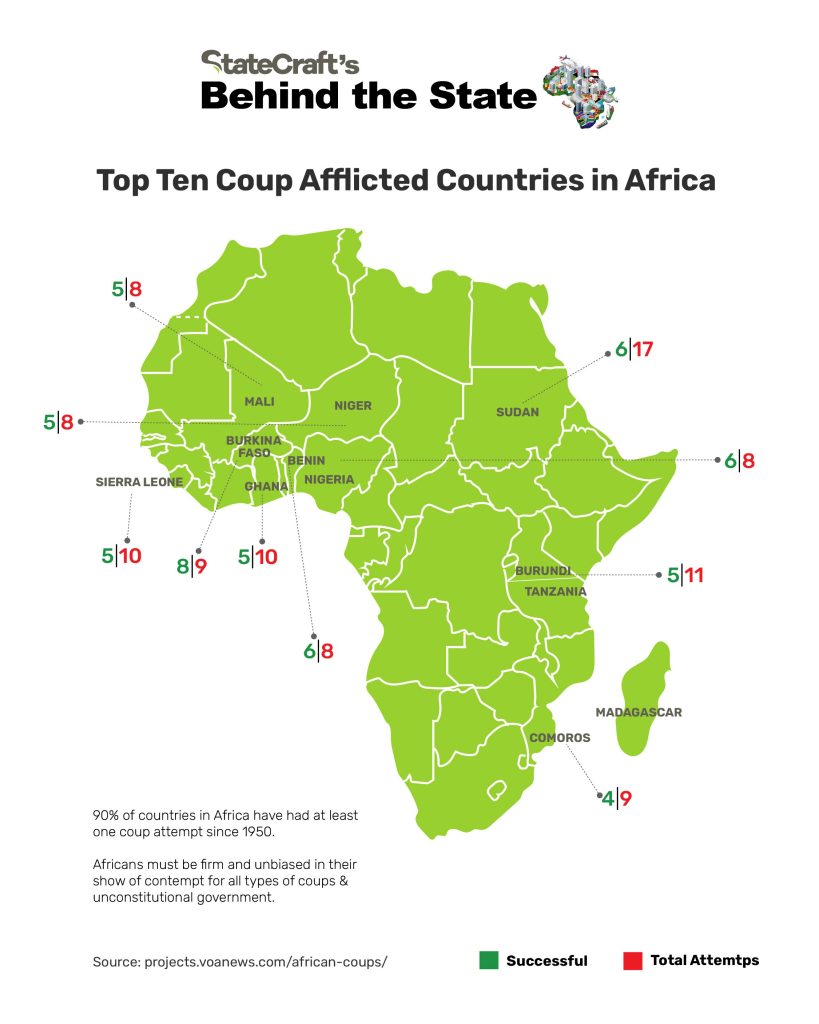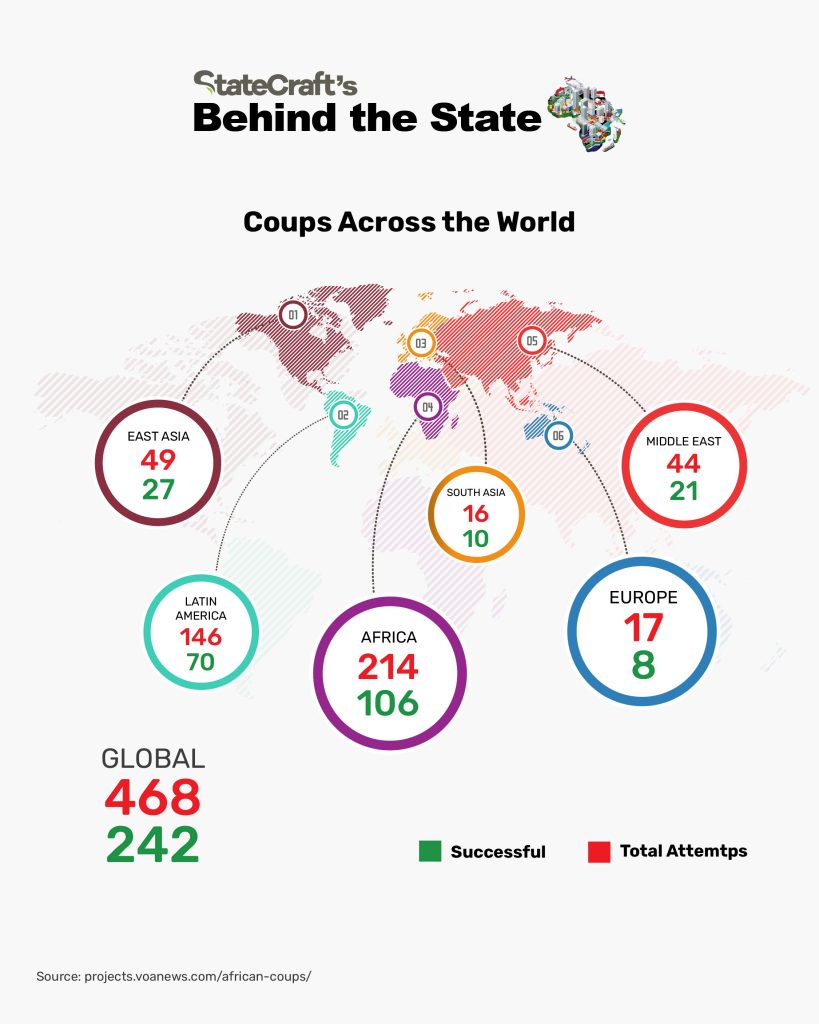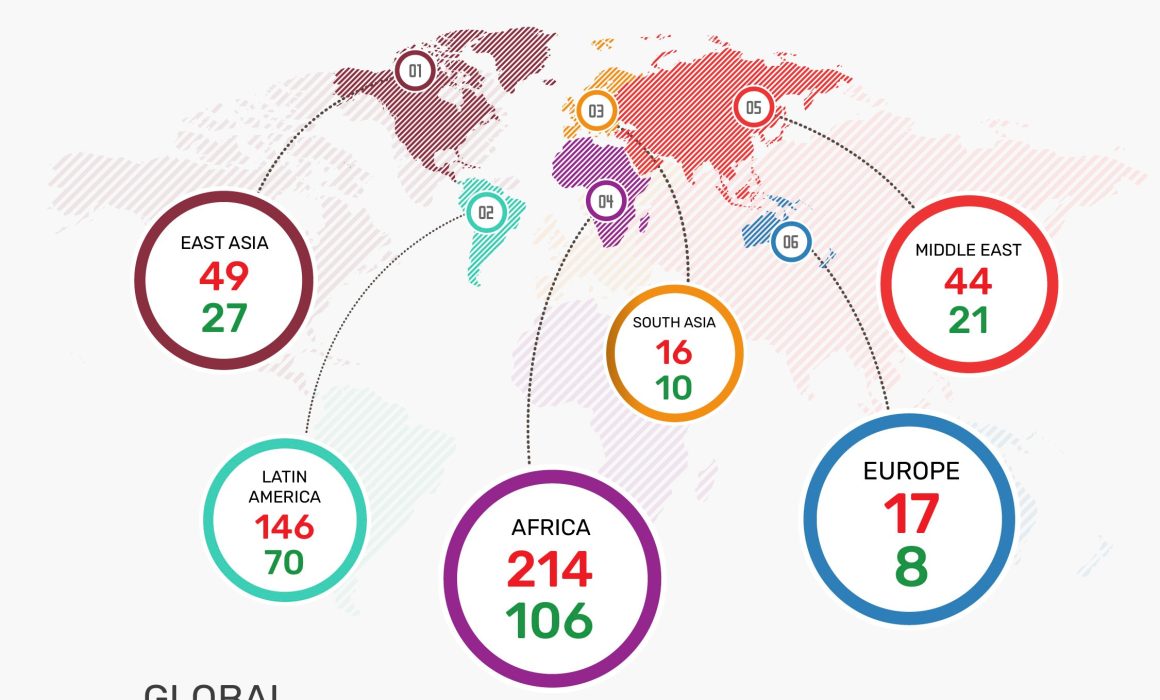Africa: Preventing a coup frenzy
On Wednesday, July 26, 2022, news broke of a coup in Niger, the Presidential guard led by General Abdourahamane Tchiani had ousted the country’s 10th president, Mohamed Bazoum. The usual condemnations flew in as many Nigeriens jubilated on the street. The Africa Union (AU) and the Economic Community of West Africa States (ECOWAS) reiterated their zero tolerance for unconstitutional changes of government while asking for the immediate and unconditional release of President Mohamed Bazoum and other detainees, and respect for human rights, including protection of their physical health and moral integrity.
A tale of many – or different? – coups
Africa led in coups between 1950 and 2010, accounting for 36.5% of all coups globally. There have been over 200 coups and attempted coups in Africa. In each decade between 1958 and 2008, West Africa, designated as a “coup-belt”, had the highest number of coups on the continent, accounting for 44.4%. Bazoum’s ousting is one of five coups and attempted coups in the sub-region in less than four years– after two coups in Mali (September 2020 and May 2021), Guinea (2021), and Niger (March 2021).

Africa and the rest of the world
According to research information provided to Voice of America by Jonathan Powell and Clayton Thyne, of the 486 attempted or successful coups carried out around the world since 1950, Africa has seen 214, the most of any region, with 106 of them successful.

Why are coups making a comeback in AfricaThe resurgence of coups in Africa hinges on three factors, namely: failure of national governance, increase poverty, and foreign influence. A. Failure of national governance: A survey across 19 African countries which showed 6 in 10 respondents saying corruption is increasing in their country, while 2 in 3 say their governments are doing a poor job fighting it.Furthermore, 72% believe ordinary citizens “risk retaliation or other negative consequences” if they report corruption to authorities, a sign Africans believe their public institutions are not just partakers in, but active defenders of, corrupt systems.
B. Failure to combat poverty is another springboard for coups on the continent. One in three people are now unemployed in Nigeria, West Africa’s largest economy. The same goes for South Africa, the most industrialized African nation. It is now estimated that about 500 million people living in sub-Saharan African are extremely poor.The factors, in addition to tampering with constitutional terms to stay longer in power, decline citizen participation in governance, disregard for the rule of law, and weak judicial systems provide an enabling environment for coup.C. Perceive Foreign Influence: Like coups in the post-independence era, recent coups in West Africa also have foreign fingerprints. For instance, Russia is cited in both the 2021 and 2020 coups in Mali and the January 23/24 coup in Burkina Faso. Niger coup backers were sighted waving the Russian flag in the most recent coup.
Assimi Goïta, the leader of both coups in Mali, is also reported to have received US training and assistance. The influence of France in political developments in the sub-region is almost a given, due to its colonial ties to West Africa.
Mahamat Déby’s covert coup in Chad, for example, received endorsement from Paris. China, too, joined Russia in preventing France, which had the support of the US and the EU, to have the UN Security Council support a decision to impose economic and border sanctions on Mali. Indeed, whereas China criticized the putsch in Guinea, it has been quiet on Mali’s.
Thus, in the 21st century too, the quest for strategic influence and advantage by foreign powers in Africa has involved them in coups on the continent. They tolerate local politics and authoritarianism as long as their strategic advantage is served.
How to curb the coup frenzy
- Eliminate adverse socio-economic and political conditions such as extreme poverty, unemployment, and tampering of constitutional terms.
- Regional bodies such as Ecowas and AU must be firm and unbiased in their show of contempt for all types of coups.
- International avenues for punishing coup perpetrators must be supported by global powers.
- African regional organizations must resist foreign interference in African countries that leads to political instability.
What is the international community saying? The United Nations (UN) has reiterated its commitment to constitutional government in Africa, Niger inclusive. The United States through its Secretary of State also communicated its commitment to the restoration of constitutional government in Niger.
Within, the continent, regional bodies and governments have shown a resolve to restore constitutional democracy to the West African country. The African Union’s Peace and Security Council “demand the military personnel to immediately and unconditionally return to their barracks and restore constitutional authority, within a maximum period of fifteen (15) days”.
In its response to the military Junta in Niger, the Economic Community of West African States (ECOWAS) announced the closure of borders between member countries and Niger. Furthermore, all commercial and financial transactions between member states and Niger, cut electricity supply, froze Niger’s assets in ECOWAS central banks, and suspended Niger from all financial assistance and transactions with all financial institutions.
Finally, diplomatic communications are currently ongoing between international envoys and Niger’s military leadership. We hope for a quick resolution and restoration of constitutional government in Niger and other countries without constitutional governments.
Conclusion
Coups are a threat to democratic gains African countries have made in recent decades. An Afrobarometer survey conducted across 19 African countries in 2019/2020 showed just 4 in 10 respondents (42%) now believe elections work well to ensure members of parliament reflect their views and able medium to remove non-performing leaders.


